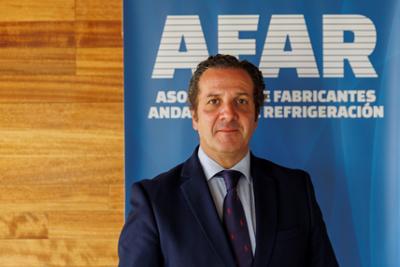

Joaquín A. Peñalver: The C&R sector has a significant economic footprint in Andalusia
AFAR companies alone have a turnover of almost €600 million and more than 3,200 direct jobs, making the region a national benchmark in terms of production volume, technical specialisation and export capacity.
The air conditioning and refrigeration sector has a significant economic footprint in Andalusia, according to the president of the Andalusian Refrigeration Manufacturers Association.
Peñalver also explains the main challenges facing the sector in this autonomous community.
How important is the refrigeration sector in Andalusia?
The refrigeration and air conditioning sector is of strategic importance and has a significant economic footprint in Andalusia. AFAR companies alone, a key player in the sector, have a turnover of almost €600 million and more than 3,200 direct jobs, making the region a national benchmark in terms of production volume, technical specialisation and export capacity. This sector not only generates stable and quality employment, but also boosts innovation and the international projection of the region.
How has the sector developed in recent years, in terms of turnover, and what are its prospects for 2025?
The sector in Spain has experienced remarkable growth in recent years, consolidating its position as a key driver in the transition towards more efficient and sustainable technologies. This progress has been driven by technological innovation, with the integration of smart systems (IoT and sensors), the growing demand for energy efficiency and environmental regulations that encourage clean technologies and the use of green refrigerants.
For 2025 and beyond, the outlook is for continued growth and transformation. Further electrification is expected, with increased demand for sustainability from consumers and regulators, driving equipment with a lower carbon footprint and greater recyclability. Connectivity and digitalisation will continue to be key trends to improve efficiency and comfort. The sector has the capacity for further growth in internationalisation, automation, digitalisation and product diversification.
What are the main challenges facing the sector in Andalusia in the coming years?
The sector in Andalusia faces several significant challenges, despite its dynamism. One of them is the adaptation to new regulations and environmental sustainability. There is excessive regulation (European, national and regional). The sector must meet European commitments on sustainability, refrigerant regulation and the transition to cleaner energy. This includes the challenge of digitalisation. The F-Gas Act, for example, requires the adaptation of products and processes to the use and handling of new refrigerant gases. In addition, the aim is to improve the energy efficiency of products and promote the circular economy, which involves the use of new materials, eco-design and the calculation of the carbon footprint.
Another challenge is the attraction and retention of qualified talent. There is a shortage of specialised technical professionals and a difficulty in finding and retaining qualified staff, also due to competition from other sectors. Companies need continuous specialised technical training in areas such as refrigeration, electricity, automation, energy efficiency, digital skills and data management.
A third challenge is trade globalisation and competition. The sector faces significant competition in national and international markets. There are export barriers (legal, technical an commercial) and an increase in imports of finished products. It also points to an oversupply of manufacturers and installers and a trend towards lower prices.
A fourth challenge is access to finance and industrial land. There is a lack of financial resources for R&D projects. In addition, the need for adequate industrial land is crucial, as many companies are constrained by a lack of space to grow, automate or incorporate new production lines in their facilities.
What AFAR initiatives would you highlight at present?
Undoubtedly, an aspect of great interest is the recent constitution and development of the Andalusian Cluster of Refrigeration and Air Conditioning (RefriClimA). This cluster was created as an initiative promoted by the Andalusian Refrigeration Manufacturers Association (AFAR) to consolidate pre-existing relations between companies and strengthen their presence in the markets. The cluster's mission is to boost the competitiveness and sustainability of the sector through collaboration between its members to develop complex innovative projects. Its vision is to become a regional, national and international reference for the sustainable and innovative development of the sector.
The RefriClimA Cluster seeks to capitalise on opportunities through a strategy of active collaboration between companies, technology centres, universities and public administrations. It was formally constituted as a non-profit association on 31 January 2025. To achieve its goals, the cluster is articulated around four strategic axes: cooperation, leadership, competitiveness and business development, and innovation and human capital.
The development of the Cluster is a fundamental step that will allow access to funds, participation in national and international networks and the reinforcement of strategic collaboration, projecting the sector as a strong economic engine in Andalusia. It is undoubtedly a great opportunity for its members, providing access to funding (with grants of up to 80% for projects), specialised training, greater visibility, shared innovation and stronger institutional representation. I call on Andalusian companies that may be interested in participating to contact AFAR to join this exciting project.





